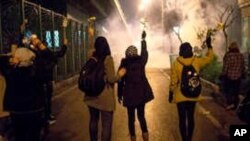Amnesty International on Wednesday accused Iran's security forces of using torture to extract confessions, saying hundreds of people have been jailed since a sweeping crackdown against protests last year.
Demonstrations erupted across Iran in November 2019 after a major petrol price hike, but they were put down by security forces with mass arrests amid a near-total internet blackout.
Amnesty said it had gathered dozens of testimonies from the 7,000 people it estimated were arrested, which included children as young as 10.
The accounts reveal "a catalogue of shocking human rights violations, including arbitrary detention, enforced disappearance, torture and other ill-treatment," the London-based human rights group said.
Those arrested were tortured into "confessions" of involvement in the protests, membership of opposition groups or contact with foreign governments and media, it added.
Torture and other ill-treatment by police, intelligence operatives and others "was widespread," the rights group said.
Amnesty said it had recorded the names of more than 500 people "subjected to unfair criminal proceedings in connection with the protests."
"Hundreds have since been sentenced to prison terms and flogging, and several to the death penalty following grossly unfair trials, which were presided over by biased judges behind closed doors," Amnesty said.
Prison sentences ranged from one month to 10 years, the report said.
Torture techniques included water boarding, beating, electric shocks, pepper spraying genitals, sexual violence, mock executions, and pulling out fingernails and toenails, Amnesty reported.
"It felt like my entire body was being pierced with millions of needles," one man allegedly tortured with electricity told Amnesty.
Another man said he was suspended from his hands and feet from a pole -- a method reportedly called "chicken kebab" by his interrogators -- the report read.
In May, Iran's interior minister suggested that up to 225 people were killed during the November protests, when petrol pumps were torched, police stations attacked, and shops looted.
A group of independent U.N. rights experts said in December that more than 400 people could have been killed in the crackdown, based on unconfirmed reports.
Iran blamed the violence that broke out during the protests on "thugs" backed by its foes the U.S., Israel and Saudi Arabia.




